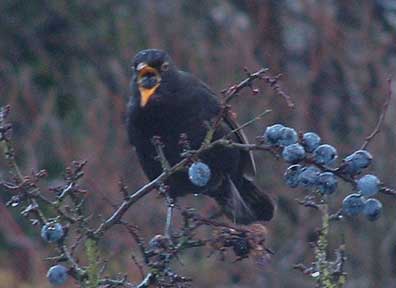A struggle to survive
by Jan Curry from The Round Hill Reporter December 2007
A struggle to survive with focus on blackbirds

I read somewhere that over the past two weeks, people have been settling down in front of their televisions to watch one particular programme more than any other. Each episode contained scenes of violence, raw sex and the struggle to survive against all odds: "Autumn Watch".
Personally, I find Bill Oddie a bit oddie but he does know his stuff and anyway it's the camera men and women behind the scenes who really deserve our admiration for their patience and determination to bring us close up to Nature in all its agony and glory.
Rusty bought me a new camera, one with a long lens, last Spring. I now have a collection of photographs showing: a bent leaf - a resting butterfly fluttered away before I could snap it; an area of grass - that should have been a hedgehog with a plum stuck on his prickles - too late (hedgehogs can move fast); a stalk - the dragonfly flew off at the wrong moment, and a tail - the fledgling blackbird that had teetered on the side of its nest for a whole morning (just outside our back door) chose to launch himself off, just as I blinked. I really do admire those camera men!
Blackbirds are my favourite birds and there are more of them in the garden than ever. In Spring they fill the air with their liquid songs, usually sung high up in a tree. They need dense shrubs or holes in sheds to hide their nests, as they don't like nest boxes; this makes them very vulnerable to marauding squirrels.
On plunging from their nests, baby blackbirds live particularly dangerously as they have to skulk in the bushes for a couple of days whilst their feathers finish growing and they find the strength to fly. Their parents still feed them during this time. Then comes the moulting season; the garden is uncannily quiet through July as no adult bird wants to draw attention to themselves at this time, as they can't fly very well during the period of feather drop. Luckily, more and more of us are growing leafy shrubs and putting bells on our cats' collars, thus helping the birds survive.
Now at last, it is late Autumn; all the challenges have passed, adult birds are free of responsibilities - they haven't even got sex on their minds - days are golden, insects and berries are still abundant but soon, too soon, food will become scarce, days and nights will be cold, water frozen; only the strongest will survive. Our gentle summer gardens are wild and brutal in the winter. We can help by offering them extra food and water and when the blackbird sings again in the Spring, it will surely have been worthwhile.
This page was last updated by Ted on 10-Nov-2013
A struggle to survive with focus on blackbirds

I read somewhere that over the past two weeks, people have been settling down in front of their televisions to watch one particular programme more than any other. Each episode contained scenes of violence, raw sex and the struggle to survive against all odds: "Autumn Watch".
Personally, I find Bill Oddie a bit oddie but he does know his stuff and anyway it's the camera men and women behind the scenes who really deserve our admiration for their patience and determination to bring us close up to Nature in all its agony and glory.
Rusty bought me a new camera, one with a long lens, last Spring. I now have a collection of photographs showing: a bent leaf - a resting butterfly fluttered away before I could snap it; an area of grass - that should have been a hedgehog with a plum stuck on his prickles - too late (hedgehogs can move fast); a stalk - the dragonfly flew off at the wrong moment, and a tail - the fledgling blackbird that had teetered on the side of its nest for a whole morning (just outside our back door) chose to launch himself off, just as I blinked. I really do admire those camera men!
Blackbirds are my favourite birds and there are more of them in the garden than ever. In Spring they fill the air with their liquid songs, usually sung high up in a tree. They need dense shrubs or holes in sheds to hide their nests, as they don't like nest boxes; this makes them very vulnerable to marauding squirrels.
On plunging from their nests, baby blackbirds live particularly dangerously as they have to skulk in the bushes for a couple of days whilst their feathers finish growing and they find the strength to fly. Their parents still feed them during this time. Then comes the moulting season; the garden is uncannily quiet through July as no adult bird wants to draw attention to themselves at this time, as they can't fly very well during the period of feather drop. Luckily, more and more of us are growing leafy shrubs and putting bells on our cats' collars, thus helping the birds survive.
Now at last, it is late Autumn; all the challenges have passed, adult birds are free of responsibilities - they haven't even got sex on their minds - days are golden, insects and berries are still abundant but soon, too soon, food will become scarce, days and nights will be cold, water frozen; only the strongest will survive. Our gentle summer gardens are wild and brutal in the winter. We can help by offering them extra food and water and when the blackbird sings again in the Spring, it will surely have been worthwhile.